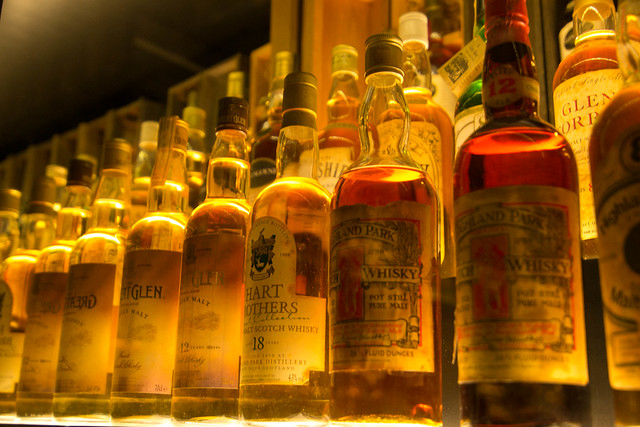Podcast: Play in new window | Download
In this episode we’re gazing into the origins of the words whisk(e)y and bourbon, both of which have Celtic roots.
Whisk(e)y is a liquor distilled from the fermented mash of grain (such as barley, rye or corn). It’s typically written with an e in Scotland, Canada and Australia, and without an e in Ireland, England and the USA. This distinction emerged in the 19th century.
It was borrowed from the Irish uisce beatha [ˈɪʃcə ˈbʲahə]) and/or the Scottish Gaelic uisge-beatha [ˈɯʃkʲə ˈbɛhə], both of which mean “water of life” and which are calques of the Latin aqua vitae (“water of life”) [source].
The spelling and pronounciation of this word in English has varied over time: uskebeaghe (1581), usquebaugh (1610), usquebath (1621), and usquebae (1715). These were abbreviated to usque, which became whisk(e)y, which first appeared in writing in 1715 [source].
Related words in the modern Celtic languages include:
- uisce [ˈɪʃk̟ɪ] = water, rain, tears, saliva and in Irish
- uisge [ɯʃgʲə] = water, rain in Scottish Gaelic
- ushtey [ˈuʃtʲə] = water in Manx
- beatha [ˈbʲahə] = life, living, sustenance in Irish
- beatha [bɛhə] = life, existence, food in Scottish Gaelic
- bea = animation, life, lifespan in Manx
- bywyd [ˈbəu̯ɨ̞d/ˈbou̯ɪd] = life, existence; liveliness in Welsh
- bewnans [‘bɛʊnans] = life, living in Cornish Gaelic
- buhez [ˈbyːe(z)] = life in Breton
More about words for water and life in Celtic languages.
The word bourbon refers to a type of whiskey, named after Bourbon County in Kentucky, and/or Bourbon Street in New Orleans. Both names come from the French House of Bourbon, which is named after the lordship of Bourbon l’Archambault, which is now a town in the Allier department in Auvergne-Rhône-Alpes region in central France [source].
In the UK a Bourbon (biscuit) is a sandwich biscuit consisting of two thin rectangular dark chocolate-flavoured biscuits with a chocolate buttercream filling. The name also comes from the French House of Bourbon. According to a 2009 survey, it’s the fifth most popular biscuit in the UK for dunking in tea [source].
The French name Bourbon comes from Borvo, the name of a Celtic deity associated with hot springs, from Proto-Celtic *borvo (froth, foam), from Proto-Indo-European *bʰrewh₁- (to be hot, boil).
Words from the same PIE root include bruth (heat, rash, eruption) in Irish, bruth (heat, fire) in Scottish Gaelic, brooan (rash, eruption) in Manx, brwd (eager, keen, passionate) in Welsh, broud (ember, excitement) in Breton [more details of these words], and also bread, brew, broth, burn and fervor in English [source].
You can find more connections between Celtic and other languages on the Celtiadur blog. I also write about words, etymology and other language-related topics on the Omniglot Blog.
Radio Omniglot podcasts are brought to you in association with Blubrry Podcast Hosting, a great place to host your podcasts. Get your first month free with the promo code omniglot.



